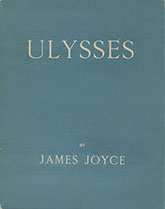Ulysses
Critique • Quotes • At the movies
 First edition
First editionFirst publication
1822
Literary form
Novel
Genres
Literary
Writing language
English
Author's country
Ireland
Length
Approx. 286,000 words
Adrift on the stream of consciousness
I've read Ulysses five times. It's not that I love it so much.
It may be because I've heard so often this is the greatest novel of the twentieth century. Or perhaps because it's so difficult, I figured I had to keep reading it until I got it.
I think I get it now. I think I'll never have to read it again.
Oh, I might reread Molly Bloom's long unpunctuated soliloquy that ends the book. She's the randy, cheating, concert-singing wife of advertising agent Leopold Bloom, whose wanderings about Dublin are followed in much of the book.
When Joyce gets around to writing frankly the thoughts passing through Molly's mind, the result is wonderful, much different from the cerebral ramblings of her husband and the other main character, Stephen Dedalus.
Molly's direct, simple language speaks to—and moves—me more than all the rest of the novel. It concludes Ulysses on a passionate, life-affirming note. It's also the part of the novel most often cited for its dirty bits, but that may just add to the interest.
I might again browse through a few of the other livelier sections, like the phantasmagoric visit to the red-light district by Stephen Dedalus. The young man has loosened up some since his overheated, religion-saturated appearance in A Portrait of the Artist as a Young Man, but he is still insufferably self-absorbed. The section is written as an hallucinatory, demonic piece of theatre.
Over the top
Ulysses is famous of course for introducing stream of consciousness to fiction. Actually it wasn't invented by Joyce. Laurence Sterne probably gets that credit with Tristram Shandy, which at least is very funny. But Joyce made it a hallmark of modernist literature. Characters' thoughts, fragments of memory and fantasies are mixed with input from the outside world.
But it is all rather academic. Joyce attempts with a diverse repertoire of literary effects to replicate the flow of sensation through characters' minds, but I doubt anyone has such consistently intelligible thought processes as the characters in Ulysses do. Most of us experience vast stretches of mental time passed without any thoughts expressed internally in words.
This is a failing of the literary stream-of-consciousness method. An author must include blank pages, musical notes, streams of associated and dissociated images, etc., or give up the pretence of eproducing the mental process. Authors have to acknowledge that, out of the nearly infinite range of daily human experience, they are selecting specific items to put together artificially to represent through language what is largely inarticulate.
The stream-of-consciousness approach introduced by Joyce has had a great effect on writing, but Ulysses may be the over-the-top experiment (we won't get into Finnegans Wake here) that has allowed other writers to use the technique selectively as is appropriate in their writing.
Overbearing allegory
I have to mention the significance of the title. Yes, the peregrinations of the characters around the city is supposed to parallel the adventures of Ulysses (Bloom) and his son Telemachus (Stephen) in Homer's Odyssey until Ulysses arrives home to his Penelope (Molly). The aforementioned trip to "nighttown" (the brothels) is like Ulysses' descent to Hades, and so on.
The formal writing style varies widely, adapting to each episode At one point Joyce writes in an evolving style that recreates the history of literature. Which you might think would excite one who enjoys being an amateur literary historian.
But these kinds of overbearing allegory and literary pretension leave me, as a reader of creative narratives, quite cold. A novel either works with characterization, story, plot and such, or it doesn't. Noting that it is structurally similar to some other great work or myth—or to all great works and myths—doesn't make it any more engaging. Though it is the sort of intellectual puzzle that excites many a literary critic.
You may think that my many readings of such a multi-layered and widely admired literary achievement as Ulysses would give me more to say about it. But it doesn't. No more than I would expect you to appreciate an hours-long recitation of every profound and trivial thought that passed through my brain yesterday. (Note to self: An idea for my next novel....)
— Eric
Critique • Quotes • At the movies

